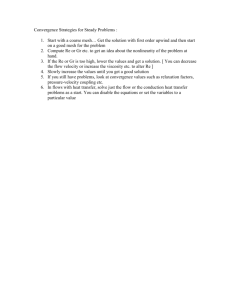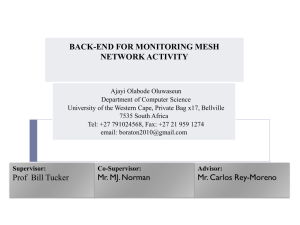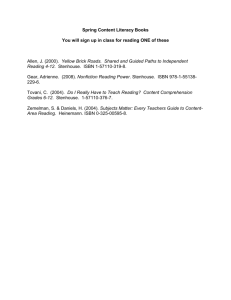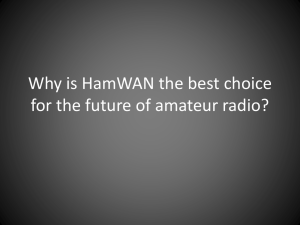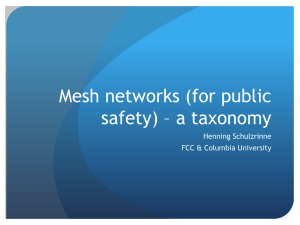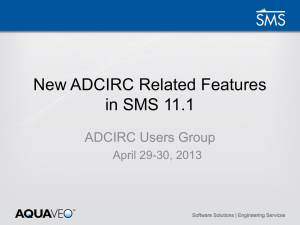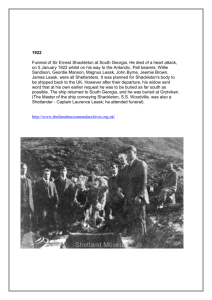MESH www.meshguides.org
advertisement
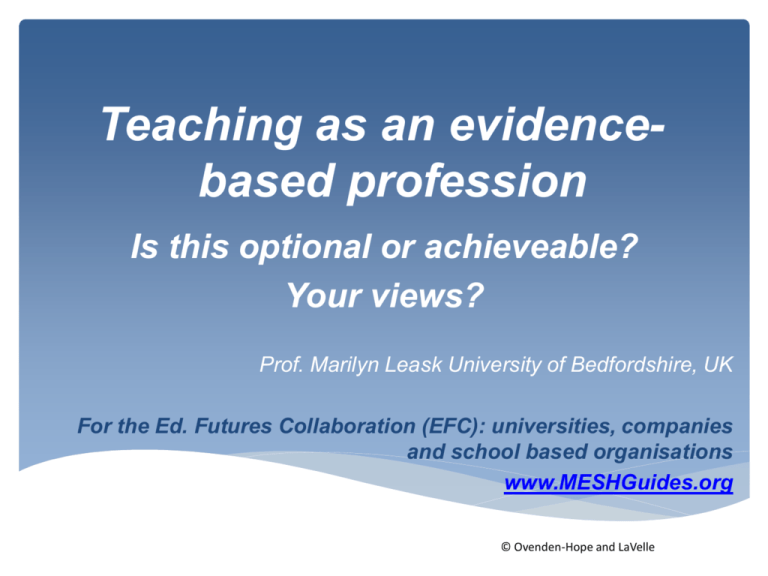
Teaching as an evidencebased profession Is this optional or achieveable? Your views? Prof. Marilyn Leask University of Bedfordshire, UK For the Ed. Futures Collaboration (EFC): universities, companies and school based organisations www.MESHGuides.org © Ovenden-Hope and LaVelle Speaker background Professional background Teacher, teacher researcher, assistant head (secondary), supply teacher University teacher educator Researcher – teacher knowledge, digital technologies Government roles Author: Text books Roles on external bodies OECD, EU and UK govt. advisory roles UK Research Assessment 2008 Professional associations UCET, ITTE, BERA, ICET Editor: Mapping Educational Specialist knowHow (MESH) www.MESHguides.org Definitions Research/evidence+ professional judgment = researchinformed practice Knowledge management: a form of practices, well known in other sectors with specified strategies for: Sharing, Finding, Using, Creating, Managing knowledge relevant to the particular industry. Translational research: in medicine, from ‘benchtop to bedside’, in education ‘concept to classroom’. Same research methods but different forms of publication and different foci. An OECD challenge – from 23 country TALLIS survey The OECD calls for the: “creation of ‘knowledge-rich’, evidence-based education systems…” “in many countries, education is still far from being a knowledge industry in the sense that its own practices are not yet being transformed by knowledge about the efficacy of those practices.” (OECD, 2009, p.3) , Context: moving from 19th to 21st C practice LEASK, M. (2011) Improving the Professional Knowledge Base for Education: using knowledge management and Web 2.0 tools, Policy Futures in Education, 9(5), 644-660. ackn Ralph Tabberer prev. CEO, UK TDA. 2004 electronic networks/internet informal networking and electronic sharing 19th C historic oral tradition rapid dissemination, globalism low cost updating, ease of knowledge building through online communities ‘extended professionalism’ research informed policy & practice better coherence in R&D Increased codification of knowledge isolated practice, localism restricted professionalism’ slow print dissemination limited publishing opportunities pre-electronic networking How does our English system score for supporting the 5 main knowledge management behaviours (Leask, M (2011) Improving the Professional Knowledge Base for Education: using knowledge management and Web 2.0 tools. Journal for Policy Futures 9 (5) 2011, 644-660) Imagine… Imagine…personalised prof. dev. -teachers could easily access at the touch of a button research based pedagogic knowledge including about barriers to learning threshold and troublesome concepts at a finegrained level pedagogical tools such as diagnosis and intervention strategies, explanations, demonstrations, modelling, questioning used by successful teachers – in every subject, for every type of learner at key stages - teachers demonstrating achievement of standards could show how they drew on and contributed to the evidence base - educators collaborated to develop such a quality assured Wikipedia type resource… Imagine…if Researchers, research funding bodies, teachers undertaking research could easily see gaps in the research base see what topics are well researched find questions teachers want researched cost effectively collaborate across regions to scale up and test out emerging practice in different settings Easily find out what was best practice in other countries. Our evidence base for effective practice was based on cumulative research over years, across settings rather than being small scale, diverse and rarely useful in providing a foundation for practice or policy making Why work differently? Poorly organised knowledge base Can a teacher access research-based advice easily? Plethora of small scale ed. research /systematic reviews web repositories out of date limited access to relevant research by users costs/challenge of teacher/teacher educator professional development Digital technologies new opportunities 5 standard behaviours expected in organisations which value acumulated knowledge finding managing sharing using creating A need for national infrastructure and co-ordination –via maybe the College of Teaching? National repository: Access to research summaries written in a form relevant to teachers but updated through feedback loops from teachers using and developing work in the area A shared understanding of tools teachers can use within the time available to produce reliable research findings which can be built upon Online communities environment to support likeminded people finding each other and to provide a focal point for work in particular areas. A system for state of the nation online surveys allowing the education sector to pool knowledge. Working differently: who will lead? Will there ever be enough additional money – no Could we do more with the slivers of time we have now – ?? Do we need to work differently – yes Can we take control of our professional knowledge base and professionalise teaching worldwide? Hmmm….requires collaboration…. What are some options? The MESHGuides system – a response to access and relevance issues Translational research and the mobilisation of knowledge MESH guides propose the use of translational research, more often associated with medicine, but here refer to evidence-based resources for educational practitioners enabling knowledge mobilisation. Smith and Helfenbein (2009) identified that translational research ‘creates a space for collaborative, co-constructed inquiry that values and utilizes the expertise of all stakeholders involved’. MESH Guides provides that ‘space’ for co-created, peer reviewed, evidence-based, internationally sourced educational resources. MESH guides: underpin professional judgement/s with research based and peer reviewed evidence raise learner attainment through informed professional teaching MESH is a system, sustainable within current resources, supporting educators to: pool, build, test and publish knowledge in new ways through world wide collaborations access to research based advice to improve teaching and so improve learning outcomes to work cost-effectively to revisit, update research and republish research in ways previously not possible. Learning from others Campbell collaboration Map of Medicine: evidence based care maps Cochrane Collaboration: systematic reviews (medicine) National Institute for Clinical and Health Excellence (NICE) Social Care Institute of Excellence Local government association Knowledge Hub NHS direct Find this by googling ‘Map This was developed by doc Hospital who were trainin edited book. Each pathwa national subscription to ke to use. Clicking on any of these items leads to a flow char as shown on the next slid with each bubble clickabl for further information Map of Medicine Healthguides MESH Guide example Verification is through peer review of all pathways and is transparent MESH is set up to: • underpin professional judgement with evidence • raise learner attainment through professionalising teaching MESH is a system, sustainable within current resources, supporting educators to • pool, build, test and publish knowledge in new ways through world wide collaborations • access to research based advice to improve teaching and so improve learning outcomes • to work cost-effectively to revisit, update research and republish research in ways previously not possible. MESH – accessed in 123 countries Could we, as a sector, agree on a standard set of tools? Tool 3 Synthesis/lit. reviews. Tool 4: Action research – testing kn./creating Tool 1: TACTICS framework Tool 2 Mini RCTs Tool 6: online communities Tool 7 National surveys. Tool 5 Publishing differently eg MESHGuides. Tool 5: Pyramid model of connected outputs from research publications (BERA, 2000, p.3) Press release Existing Journals Brit. Library Ethos + ?? Professional report Academic paper accredited by referee Full report giving sufficient detail for replication and audit Examples MESHGuides (research summaries written for users) Professional association journals SSAT TEEP materials BERA Insights and Curriculum Foundation materials Forms of professional knowledge • 1(Subject) Content knowledge, i.e. the subject material – gained through university degree and ongoing professional development • 2. General Pedagogic knowledge, i.e. the broad principles and strategies of classroom management and organisation that apply irrespective of the subject – gained from initial and continuing professional development • 3. Curriculum Knowledge, i.e. the materials and programmes eg school and national curricula and materials – gained from initial and continuing professional development and employing school • 4. Pedagogical content knowledge, i.e. how to teach specific concepts effectively so all learners progress - – gained from initial and continuing professional development • 5. Knowledge of learners and their characteristics: learning sciences i.e. neuroscience, sociology and psychology -– gained from initial and continuing professional development • 6. Knowledge of educational contexts – local school, community and family values and backgrounds – gained from initial and continuing professional development and from employing school • 7. Knowledge of educational ends (aims), purposes, values and philosophical and historical influences: both short and long term goals of education and of a subject. from Capel, Leask and Turner (2009:14) adapted from Shulman, 1987 Tools 1-4 Action Research Stenhouse, Lawrence Prof of Ed. 1975 An introduction to curriculum research and development. Heinemann p. 142 para 1 and 2, p.157 para 5, Current action research practice is only half of Stenhouse’s vision. Context for his work: evaluation of major national curriculum project engaging teachers as researchers. His vision: teachers’ case studies of classrooms would be synthesised. 6,7 Stenhouse’s vision p.142 • “[Action research has] major implications for the betterment of schools…curriculum research and development ought to belong to the teacher…it will require a generation of work…the teacher’s professional self-image and conditions of work will have to change…each classroom is a laboratory…each teacher a member of a scientific community…[leading to] critical testing rather than acceptance • “The idea is that the curricular [research] should feed a teacher’s personal research and development programme through which he/she is progressively increasing his understanding of his own work and hence bettering his teaching” p.143 • He discusses methodological problems p.157. These have been researched and solutions proposed see Leask (1988) http://library.beds.ac.uk/record=b1468955~S20 • “Each classroom should not be an island…teachers working to such a tradition should communicate with one another…they should report their work…a common vocabulary of concepts and a syntax of theory need to be developed…If teacher reports their own work in such a tradition, case studies will accumulate, just as they do in medicine. Professional research workers will have to master this material and scrutinize it for general trends. It is out of this synthetic task that general propositional theory can be developed. “ Stenhouse 1975 p. 157 Where are we with Stenhouse’s synthesis challenge? UK Educational research – endless generation of case studies and little synthesis e.g. 5000 case studies in primary MFL pedagogy proved impossible to synthesise. Quality of reporting was variable so comparison was difficult. What would you like to do? 6 week interventions around common topics? Tool 1 Tactics • Topic of your choice Tool 4 Action research –a) testing b) creating Tool 2 mini RCTs • ?well being • ?? • personalisation Lit reviews/ • ?well being synthesis • ?? • ?well being • ?? Tool 5 write a MESHGuide • ?? • ?? Tool 6 online communities • ?? • ?? Tool 3 MESH www.meshguides.org - the education version of medicine’s NICE? perhaps linked with the proposed College of Teaching? Change: a call to innovators/early adopters Rogers’ Theory of the diffusion of innovations
